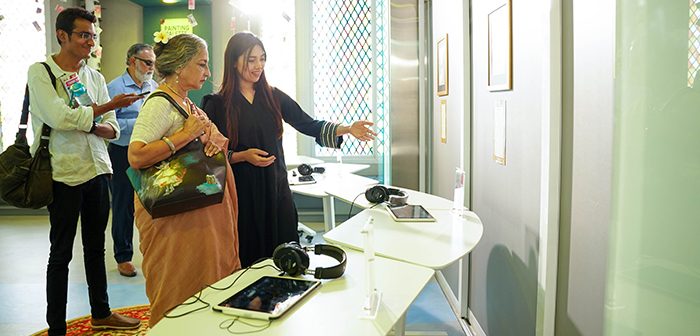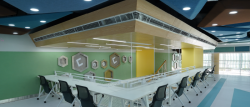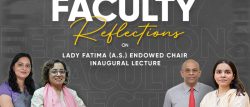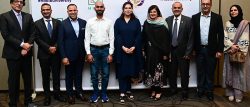On 11th May 2024, Habib University held the Final Year Project Showcase for the graduating batch of 2024. The exhibition was a vibrant display of creativity, innovation, and interdisciplinary collaboration. It highlighted over 70 final-year projects from students across various degree programs, including Comparative Humanities, Communication and Design, Electrical Engineering and Computer Engineering, Social Development and Policy, and Computer Science.
Esteemed Guests and Film Jury
The students presenting at Habib University’s Final Year Project Showcase 2024 utilized diverse mediums, such as poster presentations, film screenings, mixed media installations, prototypes, and UI/UX displays, attracting esteemed guests from various backgrounds.
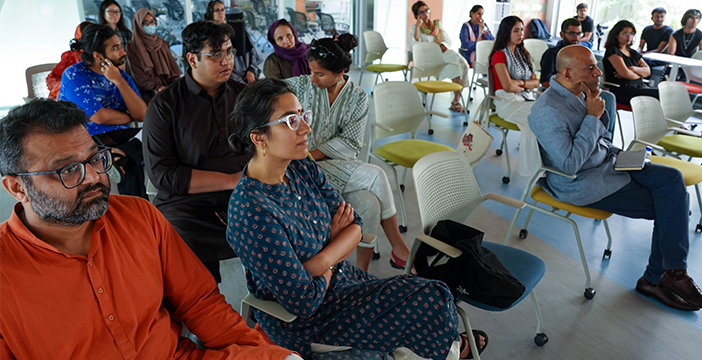
Notable attendees included Sheema Kermani, a renowned Pakistani classical dancer, Dr. Faraz Hyder from NED University, Hassan Akram from Dawlance, and Mehermah Shafat from Aga Khan University. Additionally, the film jury comprised professionals from various fields of filmmaking, such as writers, directors, animators, and designers, ensuring an insightful evaluation.
Communication and Design Highlights
On the day of the FYP Showcase 2024, Khadija Sohail Shafi, a Communication and Design student, showcased a mixed media installation titled “Kitnay Jahaan Aur Bhi Hain.” This project was an exploration of grief, memory, and dreaming presented as an illustrated novelette and a series of artifacts. The project explored a girl’s reflections on her life after a tragedy through a collection of illustrated memories, offering a beautiful exploration of loss and resilience.
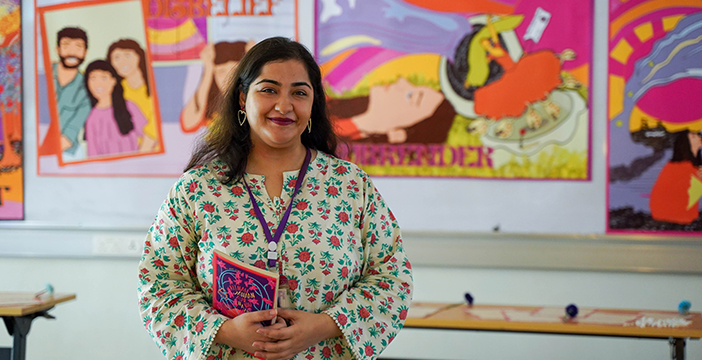
Another notable project by CND students Vardha Azeemi and Bushra Irfan was “Karigari”, a mobile app designed to empower local artisans to sell traditional crafts of Pakistan. This app aims to support artisans and preserve Pakistan’s rich cultural heritage by providing a marketplace for handmade items.
Comparative Humanities Projects
Tasneem Ali Lanewala, a Comparative Humanities student at Habib, explored pain in her paper as an experience, not just a problem. She used Foucault’s and Zizek’s theories, exploring the implications of pain removal in modern medicine and literature, particularly in “Brave New World.”
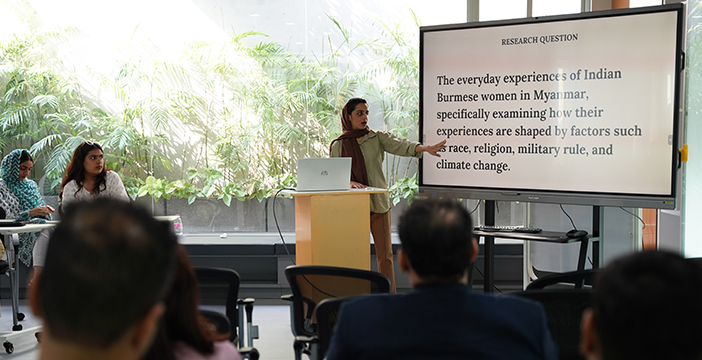
Another CH student, Samana Batul, delved into Shehr e Ashob, a poetic genre lamenting Delhi’s decline during the Mughal Empire, connecting it to present sectarian violence. Her paper, “Divinity of Desire,” examined Gandhi and Ghalib’s teachings on non-violence, emphasizing their active resistance and the significance of desire, equality, and dependency in non-violent movements.
Social Development and Policy Projects
A Social Development and Policy student at Habib, Aimen showcased her project titled ‘Jugaad’ (frugal innovation), which offered a humorous yet critical perspective on the systemic issues leading people to seek unconventional solutions. By starting with viral memes and concluding with an analysis of systemic faults, Aimen highlighted the socio-economic conditions that drive innovation out of necessity.
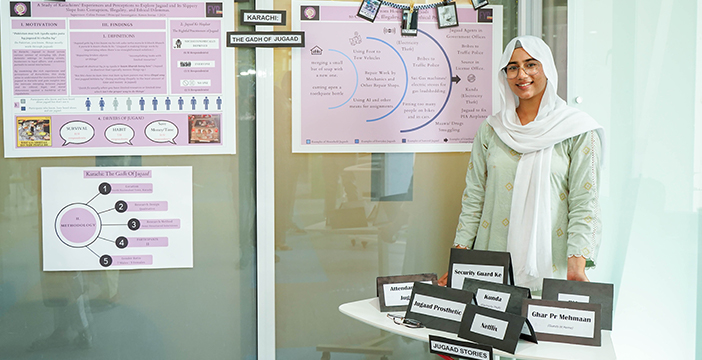
Another project from SDP, “Deewarein Bolti Hain” examined Karachi’s wall chalkings through 12 interviews. The project explored how locals perceive walls around the city—either as displays of power and exploitation or as tools for mobilization and resistance.
Electrical and Computer Engineering Projects
Students from the BS Electrical Engineering and BS Computer Engineering programs also presented remarkable projects. Mustafa Sohail and Murtaza Ali Khokar developed ‘Satellite Hydro-informatics for Water Resource Assessment in Pakistan,’ a software that provides accurate information about the nation’s water resources. This project was a step towards addressing critical water management issues.
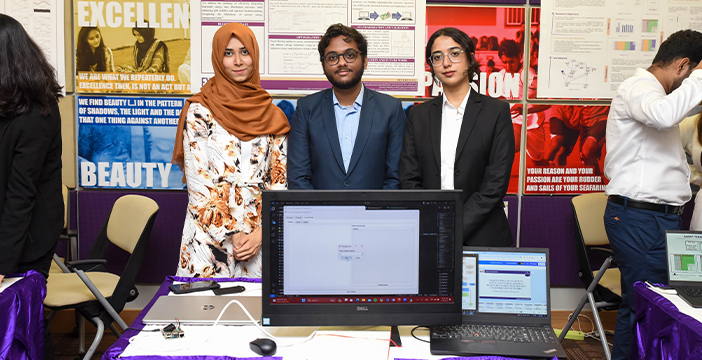
Another notable ECE project was the ‘Smart Energy Management Application for Maximizing Renewable Energy Penetration’ by Sumaira Khan, Rida Zehra, and Daniyal Lightwal. This software aimed to integrate renewable energy into distribution networks more effectively, enhancing grid stability and operator decision-making.
Computer Science Projects
One of the innovative Computer Science projects, ‘Saathi: Your Sustainable Commute Solution,’ is an application developed by Muneeb Shafique, Fatima Alvi, Shayan Qadri, and Sajeel Alam. This project addressed the environmental and financial challenges of single-occupancy commuting. The application focuses on sustainable transportation solutions for students and corporate employees.
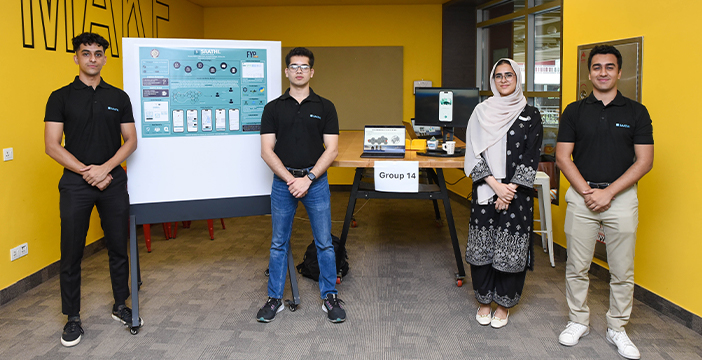
Building a Culture of Research Excellence
Habib University’s final year project showcase shows its commitment to undergraduate research and experiential learning. Over four years, students engage in hands-on experiences and create projects rooted in strong research, supported by dedicated faculty and institutional programs. As one of the top universities in Pakistan, Habib University encourages interdisciplinary collaboration and prepares students to make a meaningful impact on society.

